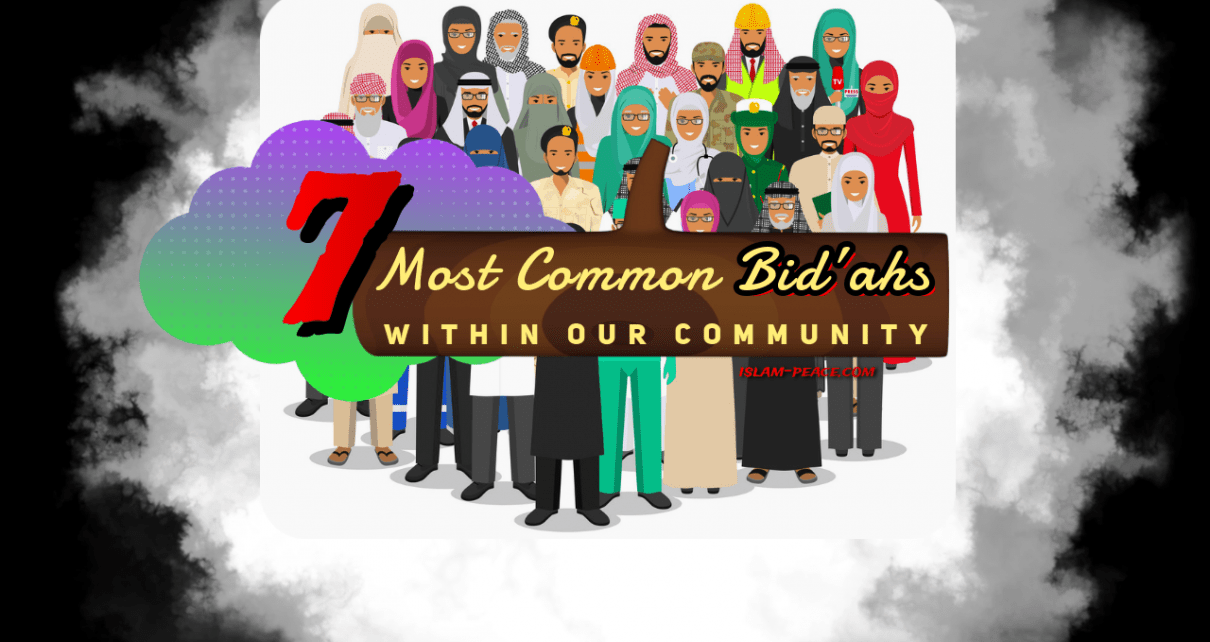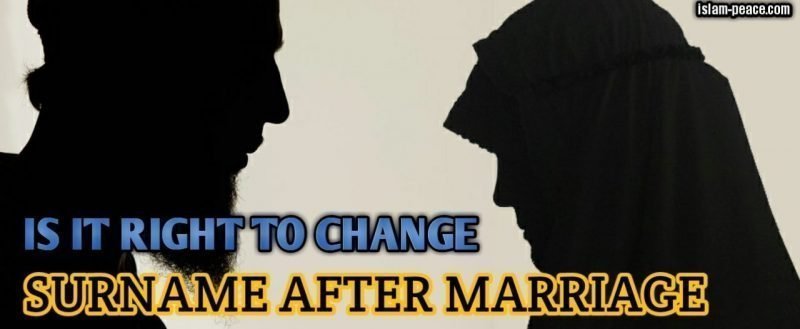7 Most Common Bid’ahs Within Our Community (Bidah)

Our Prophet Muhammad (peace be upon him) advised Keep to my Sunnah and that of the rightly guided Caliphs and hold on to it with your molars. But beware of innovations (bidah) for verily they are all bid’ah which themselves are all misguidance leading to the hellfire.
Sunan Abu Dawud: Eng Trans: vol 3 pg1294 no 4590
1: Kissing the thumb
It is a tradition in mostly India/Pakistan that whenever the Prophet’s (peace and blessings be upon him) name is mentioned, people kiss their thumbs, and touch their eyes with it.
The narration that is used as proof is attributed to Abu Bakr as-Siddeeq (radhiallahu anhu) that when he heard the mu’adhdhin say “anna Muhammadur Rasoolullah” he would kiss his thumbs, and index fingers, and then touch his eyes, and the Prophet (peace and blessings be upon him) said “whoever does this like my beloved has done, then my intercession will be compulsory for him.”
It has been narrated in al-Musnadul Firdaws by as-Daylamee.
Sheikh Muhammad Naasirud-Deen al-Albaanee (rahimahullah) says this hadeeth is not saheeh.
Ibn Tahir says in at-Tadhkirah that it is not saheeh,
and Imaam ash-Shawkaanee in al-Hadeethul-Mawdoo’ah (pg9) and Imaam as-Sakhaawee in al-Maqaasid, have also said that it is not saheeh.
2: Isaal-E-Thawaab/Khatam-e-Quran and Fatihah
Isaal-E-Thawaab (means of passing rewards to the deceased)
Conveying rewards to one who has passed away is very important, but most people practice this in a way that is against the actual teachings of the Qur’an and Sunnah. Many of these false practices originated from India/Pakistan have their origins from the Hindu religion.
The historian Al-Bairooni (303AH) mentions in his book ‘Kitab-ul-Hind’(p270) that “Hindus have fixed days and dates for the deceased persons family on which they should invite people, provide food etc. (The 11th day after death, the 15th day, annually, and specifically the 6th day of the month). The family members are expected to provide food and water for 9 days. Otherwise, according to their belief, the souls of the deceased will wander in hunger, and thirst around the house.”
Khatam/Fatihah
*Jabeer Ibn Abdullah (ra)(d.51H) said:
“We (i.e. the Companions) would consider it a form of lamenting, and mourning to gather at the deceased’s house to eat from there.”
Related by Ibn Majaah (1/153), Naylul-Awtaar (4/97) and in Muntaqal Akhbaar (p221)
*Imaam Ibn Hajar al-Makkee ash-Shaafi’ee was questioned:
“What is the hukm (ruling) on the food that is prepared in the deceased’s house for the fuqaraa (poor, destitute) on the third, and the seventh day?”
He replied, “All the things mentioned in the question all in all are prohibited innovations (bidah).”
Fataawaa Kubraa (2/7)
*Al-Allamuh Taahir Ibn Muhammad al-Hanifee (d.542H) writes:
“To feast from the house of the deceased up until three days is not permissible, because feasting is done only at times of happiness.”
Khulasal Fataawaa (2/342)
*Imaam Nawawee (d.676H) writes in Sharhul Minhaaj:
“That gathering at the grave on the third day, and distributing roses (flowers) and incense, and feeding the people within specific days i.e., the 3rd, 5th, 9th, 10th, 20th, 40th, six months, and after a year, then all in all these actions are prohibited innovations (bidah).”
(From Anwaarus Sati’a)
*Ahmad Ridaa Khaan Bareilwi says about the Fatihah recitation on Thursday that:
“These are detestable, shameful, ignorant, and baatil acts, and it is necessary to remove them.”
(Ahkaamush Sharee’ah (1/10))
3: Shab-E-Baraat (15th of Sha’baan) Bidah
The Prophet Muhammad (peace be upon him) is reported in Bukhari, and Muslim as having fasted for most of Sha’baan, as it is the month before Ramadan. However, to single out, and specify any particular date of Sha’baan, such as the 15th for fasting is indeed a bidah. There is no evidence for fasting, or for engaging in night prayers specifically on the 15th of Sha’baan alone.
4: Verbal intention of prayer and fasting
Intention is compulsory for anything that we do, but intention is linked with the heart, and mind. There are no specific words to pronounce verbally for either starting of prayer or fasting.
It is established from many sources that the Prophet Muhammad (peace be upon him) and His Companions used to commence the prayer with the takbeer. It is not reported, either from the Prophet (peace be upon him) or from His Companions that they used to articulate the intention, be it silently or loudly. It is known that had the case been otherwise then for sure it would have been reported. For it is known that it is impossible according to the Sharee’ah, and the habit for the people reporting mutawaatir, to hide such a thing. Therefore, due to the fact that no one reports this, it is safe to say with certainty that it did not occur.
5: Saying ‘Ya Muhammad’ or ‘Ya Ali’
‘Ya’ is used for someone who can hear you, and is near to you e.g., ‘Ya Allah’ or the saying ‘Ya RasoolAllah’ when the Prophet Muhammad (peace and blessings be upon him) was alive.
Using Ya with the name of the Prophet (peace be upon him) has two explanations :-
1. If someone uses Ya believing that what he is reading (salat-wa-salam) for Him, Allah will forward that to the Prophet (peace be upon him), it is allowed though not a common practice of the Companions.
2. If someone says Ya believing that the Prophet Muhammad (peace be upon him) can himself listen to what he is saying, and can help him (as some within our community believe), and that the Prophet (peace be upon him) is everywhere; not only is this clear bidah, but shirk: a major unforgivable sin. These qualities are for Allah alone.
“And if Allah touches you with harm, non can remove it, but He. And if He touches you with good, then He is able to do all things.”
(Al-Quran 6:17)
It is clear from the above verse that only Allah is capable of removing anyone’s difficulties. Ali (ra) was martyred in an attack, and his son Hussain (ra) was also martyred. So if he could not help himself or his son, then how can he help us?
6: Milad-Un-Nabi (celebrating the Prophet’s (pbuh) birthday) Bidah
It is well known that the Prophet Muhammad (peace be upon him) did not celebrate His birthday at all during His lifetime, nor did He ever order it to be celebrated. Nor did He teach such to his Companions.
Therefore, the rightly guided Caliphs, and all of His Companions did not celebrate it. They were the most knowledgeable of the people concerning the Sunnah, and they were the most beloved to the Prophet (peace be upon him). They were also the most keen upon following whatever the Prophet (peace be upon him) brought.
Therefore, if one were supposed to celebrate the Prophet’s (peace be upon him) birthday, this would have been evident at their time. Similarly, not one of the scholars of the best first three generations celebrated it, nor did they order it to be done.
7: Urs (death anniversary of a saint) and Giyarahween Shareef (celebrating on the 11th of every month in memory of Sheikh Abdul Qadir Jilani)
The celebration of Urs are based on dreams certain well known pious individuals are supposed to have had, like the dream of Shah Wali Ullah on the Urs of Ghaus.
One point to understand is that the Islamic Sharee’ah is not based on dreams. We have strong sources to understand, they are the Qur’an and Sunnah. Some people base their beliefs on fabricated stories and dreams, and then contribute them to famous scholars. If we were to believe like this, then followers of every religion can quote such stories, and dreams as proof for everything they practice, and do.
If it is important, why do we not celebrate the death of the Companions or even the Prophet Muhammad (peace and blessings be upon him)? It can clearly be seen that such activities are for materialistic purposes only. The name Urs gives people a reason to decorate graves, light candles etc, which are against the teachings of Islam.
The Prophet Muhammad (peace and blessings be upon him) said:
Beware! Before you were some people who made the graves of their prophets and pious people as a places of worship. Remember; do not make the graves a place of worship. I prohibit you from this.
Saheeh Muslim (Eng. trans.) vol.1, p.269, no.1083
Sheikh Abdul Jilani of Baghdad was a great scholar, and preacher of Islam, and an author of many books. Among them is a book called ‘Ghunyatut Talibeen’, a very popular book in which he strongly encouraged following the Qur’an and Sunnah, and condemned all innovations. Those who celebrate ‘Giyarahween’ give evidence that the 11th of every month is celebrated, because Sheikh Abdul Qadir Jilani passed away on this day. If this is the criterion, then we ask ‘why do we not do the same for our Prophet Muhammad (peace be upon him) or other famous Companions?’ It is also amazing that his death anniversary comes once a year, but it is celebrated 12 times a year! This in itself shows that it is not only an innovation but also has no logic.
Believing in bidah is claiming that the Prophet Muhammad (peace and blessings be upon him) did not fully convey the message of Allah to us.
Allah says:
“This day I have perfected your religion…”
(Al-Qur’an 5:3)
So whatever was not of the religion then, at the time of Muhammad (peace and blessings be upon him) it cannot be of the religion now.
May ALLAH forgive us and guide us all to the straight path.
Ameen









